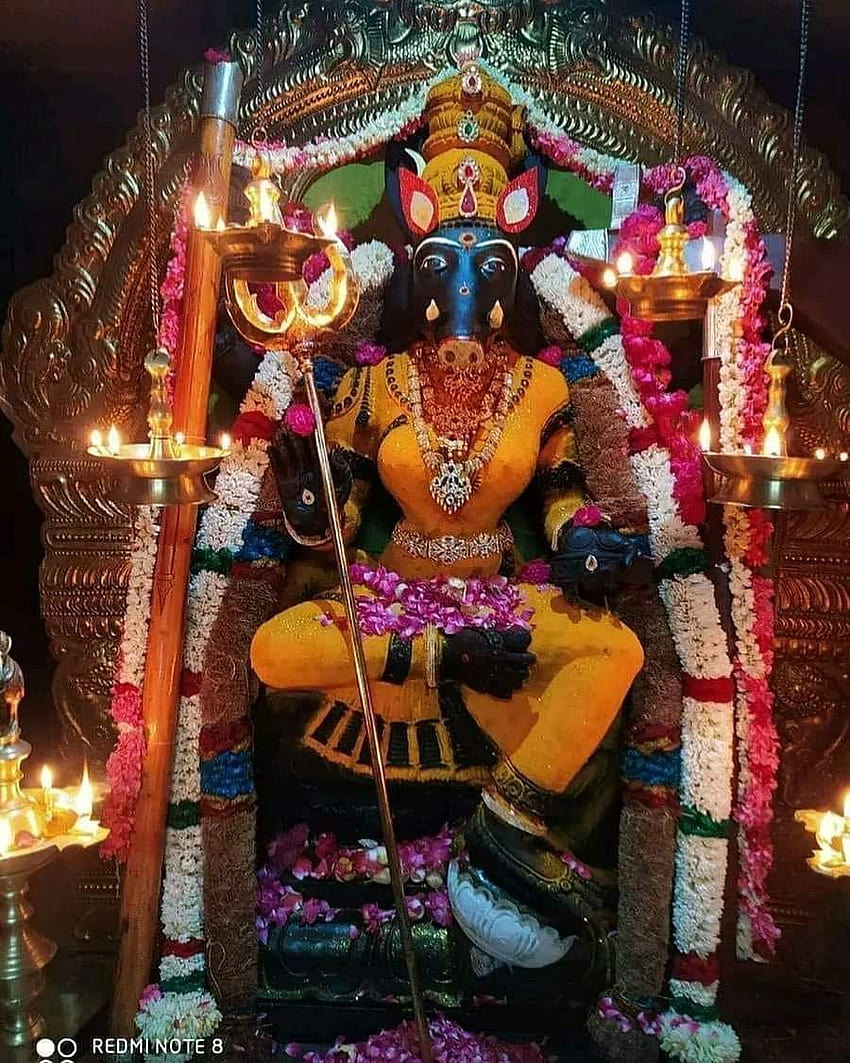VARAHI AMMAN-GODDESS OF KALIYUGA
Varahi Amman, also known as Goddess Varahi, is considered another form of Goddess Parvati and is associated with Lord Yama's energy. According to mythology, Varahi is believed to have been created from Lord Vishnu's boar form. Lord Vishnu embodies three shakti energies: Vaishnavi, Varahi, and Nrisimhi. Varahi holds a significant position among the divine mothers known as Sapta Matrikas, who play a role in protecting the cosmic order.
In tribal traditions, many deities worshipped in Hinduism have their roots. They have evolved into prominent figures within the Hindu pantheon. Goddess Varahi is one such deity. Tribal communities, particularly those with a fierce disposition, often worship female deities as their counterparts. Tribal practices also include rituals involving blood sacrifices as a form of offering. This tribal connection can be observed in the worship of Vishnu and Narasimha.
Depicted with the face of a boar, Varahi Amman embodies a dark and stormy appearance. Adorned with a Karanda Makuta (a decorative headdress), she wears coral-colored ornaments. In her hands, she carries the Sakti (spear-like weapon) and Hala (plow) while seated under a Kalpaka Tree on a Peetam (platform). The presence of a small stool supporting her left leg and anklets worn between her legs adds to her divine symbolism. As described in the Vishnudharmottara, Varahi possesses six hands, four of which hold Danda (staff), Khadga (sword), Khataka (shield), and Pasa (noose), while the remaining two hands are in the Abhaya (fearlessness) and Varada (boon-granting) mudras. According to the Purvakaranagama, her weapons are the Saringapdhanus (the Hala and Musala), and her emblem and vahana (vehicle) are both represented by the elephant.
The boar myth associated with Varahi Amman finds its roots in the story of Lord Brahma granting a boon to the demon Hiranyaksha. This boon granted him invincibility against any human or animal. Exploiting this loophole, the demon wreaked havoc, causing destruction and submerging the Earth into the ocean. Witnessing the suffering caused by Hiranyaksha, Lord Vishnu incarnated as a boar, lifting the Earth with his great tusks and restoring it to its rightful place. After a fierce battle, Lord Vishnu defeated Hiranyaksha, bringing an end to his reign of terror.
Beyond Hindu mythology, Varahi Amman is also revered in Tibetan Buddhism as an embodiment of the Dakini, an enlightened and compassionate spirit manifested in a female form. Varahi, in this tradition, is associated with the protection, concealment, and recovery of spiritual communication, texts, and sacred objects. Devotees seek her guidance for signs and prophetic interpretations. In the Buddhist context, the boar symbolism represents the desire and attachment that Dakinis strive to overcome, including material possessions, lust, and greed.
In the Sri Vidya traditions, Varahi Amman often shares an association with Goddess Kamala, one of the Mahavidyas. Varahi, as the Lady Commander of forces, represents the strength of Sri Vidya. She overcomes evil forces, assists devotees in their spiritual progress, and paralyzes their enemies, ultimately leading them to the path of Sri Vidya. While Kurukulla symbolizes the full moon, Varahi represents the new moon and the transformative power that resides within it.
Varahi Amman is a powerful goddess worshipped in Hinduism, particularly in the Tamil Nadu region of South India. She is associated with Lord Yama's energy, possesses a boar-like appearance, and is considered one of the Sapta Matrikas. Varahi is revered for her protective and transformative powers, and her worship extends beyond Hinduism into Tibetan Buddhism. Her symbolism and mythology hold deep spiritual and philosophical significance, making her a revered figure in various traditions.

